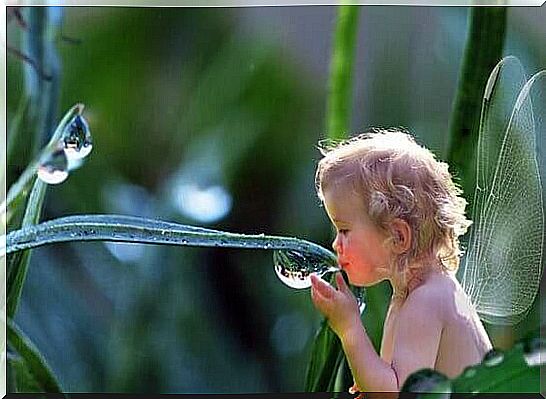Without Goodness, Intelligence Is Blind

Goodness is transmitted through caresses that give comfort, gestures that educate and examples that guide. If we sow the seeds of nobility, affection and empathy in the little ones, the world will have stronger adults, more worthy and courageous people, able to build their own path.
Although emotional intelligence is fashionable, studies or research aimed at enhancing the performance of children in school and traditional subjects continue to be given priority . Something that is affected, for example, by the US “Child Left Behind” law (no child left behind), which pushes pupils and families to improve their academic curriculum, in order not to lose financial contributions.
This law has favored the development of multiple works focused on a basic idea: to maximize the ability of memorization in children. The studies themselves are interesting from a scientific point of view, because they analyze the different models used by the brain to establish relationships, to encode data and to create new memories.
Well, the result of this law, passed by George W. Bush, is that teachers feel pressured and pupils feel frustrated. It is as if our political and social context went to one side, while neuroscience, with the results deriving from all the studies in that context, were shouting at us that it is the wrong direction.
The brain of a child needs a more complete and complex education than the current one, which affects and stimulates the practice of memory strategies. A focus on memory that goes against the “cement” which solidifies knowledge, which awakens curiosity and which lays the foundations for a strong, mature and happy personality.

Goodness in the infant brain
Let’s start by clarifying a very important aspect. When a child comes into the world, he is unable to regulate his emotions, and in his brain there is no area in which the concept of goodness is codified in a generic way. Instead, what is present is an innate and natural need to connect with what surrounds it, that is, first with one’s parents to survive, and then with one’s fellows to entertain the first social relationships.
We must understand that the emotional world of children follows a specific sequence of development in which adults must act as guides, mediators and even managers. The neurological reorganization of the infant brain is very complex, and chronological age does not always allow for a specific function, ability or goal to be put into practice. Therefore, we must be patient and respect the physical, psychomotor and emotional development of each child.
Furthermore, there are several factors that will determine the quality of this integral development in our children. When we speak of goodness, we are not referring only to education in values. We also talk about how that universe full of caresses, looks and acknowledgments outlines that connection that can allow for better neuronal development.

A child can establish contact with goodness already in primitive stages. He perceives it through his mother’s voice and his father’s arms. He notices it when he learns to speak and is heard, when he is taken as an example, when he manages his emotions and when he is taught to value others, to respect them and to respect himself.
Key points to educate to goodness
At the beginning of our article we talked about the approach that in many school centers prioritizes academic achievement in classics rather than emotional intelligence. Well, it is clear that none of us will be able to change what society demands, but it is still worthwhile to emotionally educate our children so that they are prepared for these questions. It is about knowing how to direct them from home, to be good managers of their emotions since our children are in the cradle and take their first steps.
Below we give you some tips to do this.
Educating to respect, educating to goodness
A real fact and that the book “How to Speak For Children To Listen To You & How To Listen For They To Talk To You” explains perfectly to us is that we are all excellent parents until we become parents. That is to say, before having children, we idealize growth and have a clear idea of what to do and what not to do. Later, when the children arrive, real life welcomes us.
- To educate in respect and goodness, it is necessary to be patient parents. Growing up is a daily adventure, no day is the same and a child’s needs can change from moment to moment. The most important thing in these cases is to always be the same for them, equally accessible, loving, patient, to preserve the same norms and the same examples to instill.
- Another piece of advice that Maria Montessori left us is the need to sow ideals of nobility in the child from an early age, even if he does not understand them. The day will come when these seeds will bear fruit.










